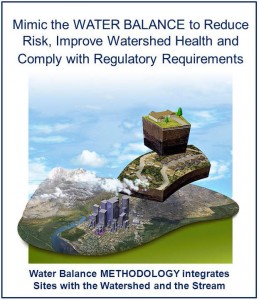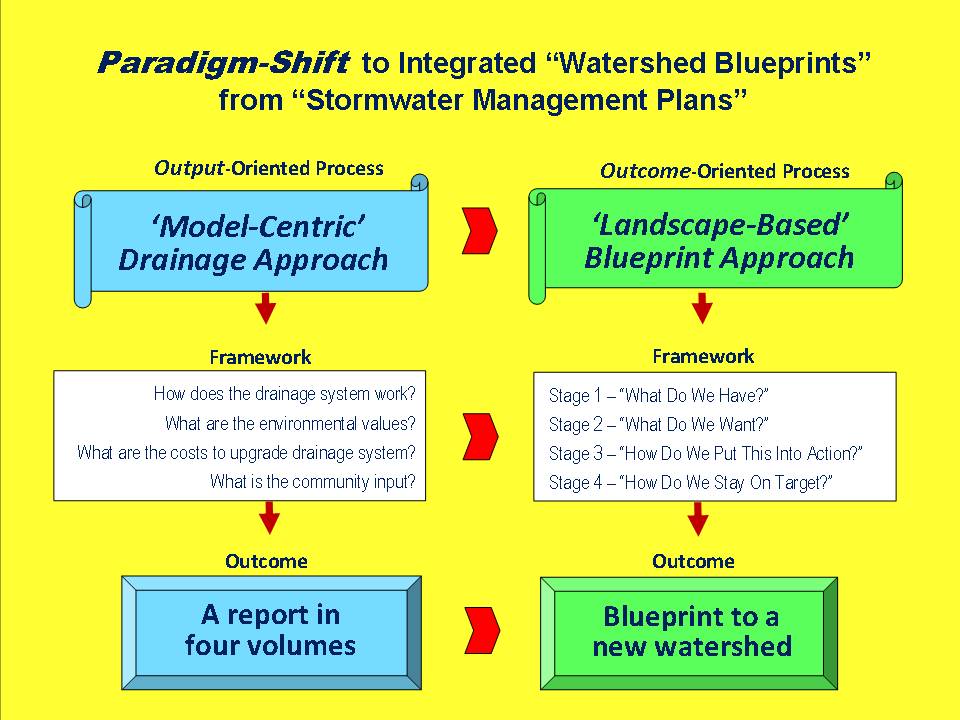FLASHBACK TO 2011 & THE COURSE ON THE ISMP COURSE CORRECTION IN METRO VANCOUVER: “Many local governments were struggling with having ISMPs done in a fashion that is meaningful for their community – we hoped that the course would open minds and lead to application of new ideas,” stated Carrie Baron, Drainage & Environment Manager, City of Surrey
Note to Reader:
In November 2011, the City of Surrey and the Partnership for Water Sustainability in British Columbia co-organized and co-hosted a 2-day course titled the ISMP Course Correction.
To download a copy of the Curriculum Overview and to learn more about the course, click on Peer-Based Learning Will Help Local Governments Implement Watershed Blueprints in BC

Integrated Stormater Management Plans:
Historical Context & Unintended Consequences
 “The genesis for ISMPs (Integrated Stormwater Management Plans) was a desire to integrate the community, engineering, planning and environmental perspectives. In 2001, Metro Vancouver’s member municipalities recognized the benefits of this approach and made a legal commitment to the Province to have ISMPs in place by 2014 for their watersheds,” reports Robert Hicks, Senior Engineer with Metro Vancouver.
“The genesis for ISMPs (Integrated Stormwater Management Plans) was a desire to integrate the community, engineering, planning and environmental perspectives. In 2001, Metro Vancouver’s member municipalities recognized the benefits of this approach and made a legal commitment to the Province to have ISMPs in place by 2014 for their watersheds,” reports Robert Hicks, Senior Engineer with Metro Vancouver.
Regulatory Driver for a ‘Course Correction’
Within a few years, however, it was evident to many in local government that the way ISMPs were being developed was resulting in unintended consequences, that is:
- ISMPs were identifying extensive and costly drainage system upgrades;
- proposed multi-million dollar capital plans were not affordable; and
- municipalities were faced with an unfunded ‘infrastructure liability’.
In February 2011, the Partnership for Water Sustainability in British Columbia released Integrated Rainwater Management Planning: Summary Report for ISMP Course Correction Series. This guidance document was intended to help municipalities do business differently so that they can protect and/or restore watershed health.
In May 2011, regulatory requirements mandated by the Minister of Environment in 2011 provided a driver for implementing a ‘course correction in the way ISMPs are developed in Metro Vancouver. At about the same time, the Partnership announced that it would be spearheading a peer-based learning program to fill a professional development need.
To Learn More:
Create a Watershed Blueprint
Branded as the Course on the ‘ISMP Course Correction’, the 2-day pilot conducted in November 2011 provided peer-based learning on how to develop ISMPs that connect the dots between land use planning, watershed health and infrastructure asset management.
 “The purpose of the pilot course hosted by Surrey was to have both local governments and consultants get together to discuss ISMPs and learn about the various ways they can be delivered. Many local governments were struggling with having these done in a fashion that is meaningful for their community – we hoped that the course would open minds and lead to application of new ideas,” states Carrie Baron, Surrey’s Drainage and Environment Manager.
“The purpose of the pilot course hosted by Surrey was to have both local governments and consultants get together to discuss ISMPs and learn about the various ways they can be delivered. Many local governments were struggling with having these done in a fashion that is meaningful for their community – we hoped that the course would open minds and lead to application of new ideas,” states Carrie Baron, Surrey’s Drainage and Environment Manager.
“The course was designed to assist local governments, other Ministries and consultants delivering the ISMPs to understand options available. Local governments in the Metro Vancouver region are required to have ISMPs completed for all their watersheds by 2014, with possible extension to 2016. Many had not started any in 2011, but would beshortly. Others had done some, but still had questions in terms of delivery and outcomes.”
Integrate the Site with the Watershed and Stream
The 2-day course built on the foundation created by Stormwater Planning: A Guidebook for British Columbia, released by the Ministry of Environment in June 2002. The theme for each day of the course corresponded to the 2-part branding for this provincial guidance document:
- Day 1-Build the Vision: 1) what we have; and 2) what we want.
- Day 2-Create the Legacy: 3) how we put this into action; and 4), how we stay on target.
The Course on the ‘ISMP Course Correction’ elaborated on methodologies and tools that will help local governments: 1) get the watershed vision right; 2) establish achievable performance targets; 3) create an affordable watershed blueprint; and 4) integrate with other processes and/or plans to incrementally implement the watershed blueprint over decades.
To Learn More:
To download an overview of the course curriculum, click on Integrating the Site with the Watershed and the Stream: Course on the “ISMP Course Correction”
Two guidance documents were released as part of the course curriculum. To download them, click on the links below:
Primer on Rainwater Management in an Urban Watershed Context – Provides an understanding of how a science-based approach has evolved since the mid-1990s.
Primer on Urban Watershed Modelling to Inform Local Government Decision Processes – Provides guidance in three areas: setting performance targets, defining levels-of-service, and application of screening / scenario tools.



